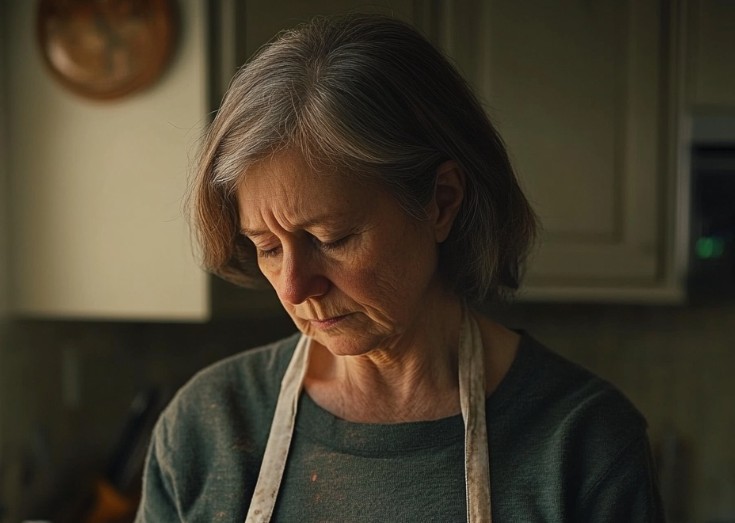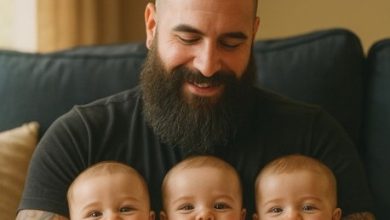They Fired My Mom Over Something Absurd — Luckily, Karma Made Sure He Paid the Price

My Mom, the Beloved “Cookie Lady”
In our town, my mother was famous for one thing above all else: cookies. She worked at Beller’s Bakery for eighteen years straight. Rain or snow, blistering heat or bitter wind, she arrived by 5 a.m. every day. Her hair was tied back in a neat bun, her apron already speckled with flour.
She had a gift for making people feel better. Children would press their tiny noses against the display case, hoping for a sneak peek at her latest batch of chocolate chip or oatmeal raisin. College students often dropped by not just for caffeine and carbs, but for my mom’s warm words when they were stressed about exams or homesick.
“Good morning, sugar,” she’d say in a soft voice that felt like a hug. “You look like a cinnamon roll and a chat could do you some good.” And that gentle humor, mixed with the smell of baking sugar, could turn any bad mood right around.
She wasn’t just selling pastries. She was giving everyone who walked through that door a moment of hope, a moment of sweetness in a world that didn’t always feel kind.
The Night Everything Changed
One evening, a fierce thunderstorm rolled in. Rain pounded the pavement so hard you could barely hear yourself think. I had just called her to say good night, and she told me she’d lock up early to avoid getting soaked.
A few minutes before closing, a man wandered in. He was disheveled, his clothes dripping, and you could see the ache of hunger in his weary eyes. Around his neck hung old dog tags—evidence that he’d once served in the armed forces. My mother’s heart went out to him instantly.
Without a second thought, she fetched him a towel to dry off. Then she quietly gathered up the extra bread rolls and a couple of leftover muffins that would have been tossed in the trash.
“It’s just going to spoil soon,” she told him, her voice calm. “Here—take these. Hope they help.”
The man’s eyes filled with tears. He thanked her over and over, then stepped back into the storm clutching those simple treats as if they were gifts of gold.
The Unjust Dismissal
The next morning, when she arrived at the bakery for her shift, she didn’t even make it to the back room to hang up her coat. The new manager, Derek—a guy who had been parachuted in from corporate headquarters—stood by the counter with his arms folded.
“I hear you gave away food last night,” he said flatly.
She blinked in surprise. “Yes, but it was food that would have been thrown out. The man’s hungry.”
He shook his head. “Company policy is clear. You can’t hand out inventory. That’s theft. You’re fired.”
She tried to reason with him. “Please understand, it was charity. He served his country—”
He cut her off. “Save it for your church. You don’t do charity on company time. Pack your things and go.”
I remember her coming home that day, her hands shaking as her keys rattled in the lock. The flour smudge on her apron still marked her as the kind soul she was. She opened the door, tried to force a smile, and said, “Don’t worry, honey. It’ll be okay.”
But tears slipped down her cheeks before she could stop them. I sat beside her as she told me what happened. She spoke softly, each word carrying the weight of her disappointment: “He fired me for giving away muffins.”
I felt a knot in my chest. “You were helping someone. That’s not stealing.”
She sighed. “There’s more goodness in me than there is in his rulebook,” she said. And then, just like that, she tucked her beloved sunflower-print apron into a drawer for the last time.
Ten Years of Quiet Growth
In the decade that followed, life moved fast. I graduated from college, tried my hand at two startups that didn’t make it, and finally found my niche running a mid-sized food-tech company. Our mission was simple: partner with local restaurants and bakeries to gather their unsold food and deliver it to people who would otherwise go hungry. We navigated every legal requirement, built solid partnerships, and grew quickly.
Meanwhile, I never stopped thinking about my mother. Even as my business expanded, I carried her lesson in my heart: good deeds matter, even when the world tells you they don’t.
The Application That Caught My Eye
One afternoon I was reviewing applications for an operations manager—someone to oversee the logistics of food collection and distribution. I skimmed resumes until one name made me stop cold:
Derek.
Same last name. Same haughty photo. His work history was a patchwork of short stints, with no steady role since his time at Beller’s Bakery.
I leaned back in my chair, memories flooding back, and decided to invite him in for an interview. After all, he had no idea who I was.
The Interview
On Thursday morning, Derek arrived promptly in a suit that looked a size too small. His tie was knotted so tightly it made his expression even more overconfident. He strode in as if he owned the place, offered a crisp handshake, and bragged about my company’s “inspiring mission.”
He sat down across from me and rattled off bullet points from his resume: “I oversee teams, streamline operations, and ensure profitability. I make tough decisions to protect the bottom line.”
I nodded, then asked a pointed question: “Tell me about a time you faced an ethical challenge at work.”
His eyes lit up. “Oh, sure. Back at Beller’s Bakery, I discovered an older employee giving away leftover baked goods at night. That was against policy, so I fired her on the spot. It was a hard call, but necessary to prevent losses.”
He chuckled as though this tale proved his leadership. But what he didn’t know was that he had just described the moment he destroyed my mother’s livelihood.
Karma’s Turn
I sat silent for a long moment, watching him squirm in his chair. Then I leaned forward and spoke with calm clarity: “That employee you fired was my mother.”
He froze. The smug grin slipped away. His eyes widened, his cheeks paling.
“You let her go for handing out bread rolls,” I said, voice steady. “She offered food that would have ended up in the trash to a homeless veteran. You turned compassion into a firing offense.”
He opened his mouth, but no words came out. I added, “There’s no role for you here. But I believe the local shelter down the street could use someone with your… strict approach to expired muffins.”
He managed a nod and left without protest.
A Long-Awaited Closure
Watching him walk out, I felt a strange sense of peace. The anger I’d held for ten years washed away. In that glass-walled conference room, the ghost of my childhood frustration finally found rest.
Later that day I called my mother. “Guess who applied for our ops manager position?”
“Who?” she whispered.
“Derek,” I said.
She gasped. “No way.”
I told her how he bragged about firing “an older woman” for charity. She made a soft, broken sound, and then we both laughed through tears. “You didn’t do that for me,” she said finally.
“I did it for that scared little boy who watched his mother come home in tears,” I replied. “But mostly I did it because we built something better.”
Full Circle
A year ago, I convinced my mother to join our company. Now she leads our community outreach team, the very heart of what we do. She organizes food drives, speaks at events about hunger, and mentors young kitchen volunteers. And yes, she still hands out bread and muffins—always with that same gentle smile—but now she does it on her own terms, without fear of being punished.
People often talk about karma as if it’s some cosmic vending machine that returns good or bad deeds. I believe karma can also work through us—through our choices to stand up, to speak out, and to build a world that rewards kindness rather than punishes it.
My mother never wanted vengeance. She sought only justice and peace. And I think we’ve found it together.
Even now, when I walk past a bakery window and catch that special smell of dough rising, I think of her. I think of how a simple act of kindness by someone with a flour-dusted apron led, years later, to a reminder that doing the right thing still matters. No matter what anyone else says. And that sometimes, all it takes is patience, persistence, and faith that the world will remember good when it sees good again.



